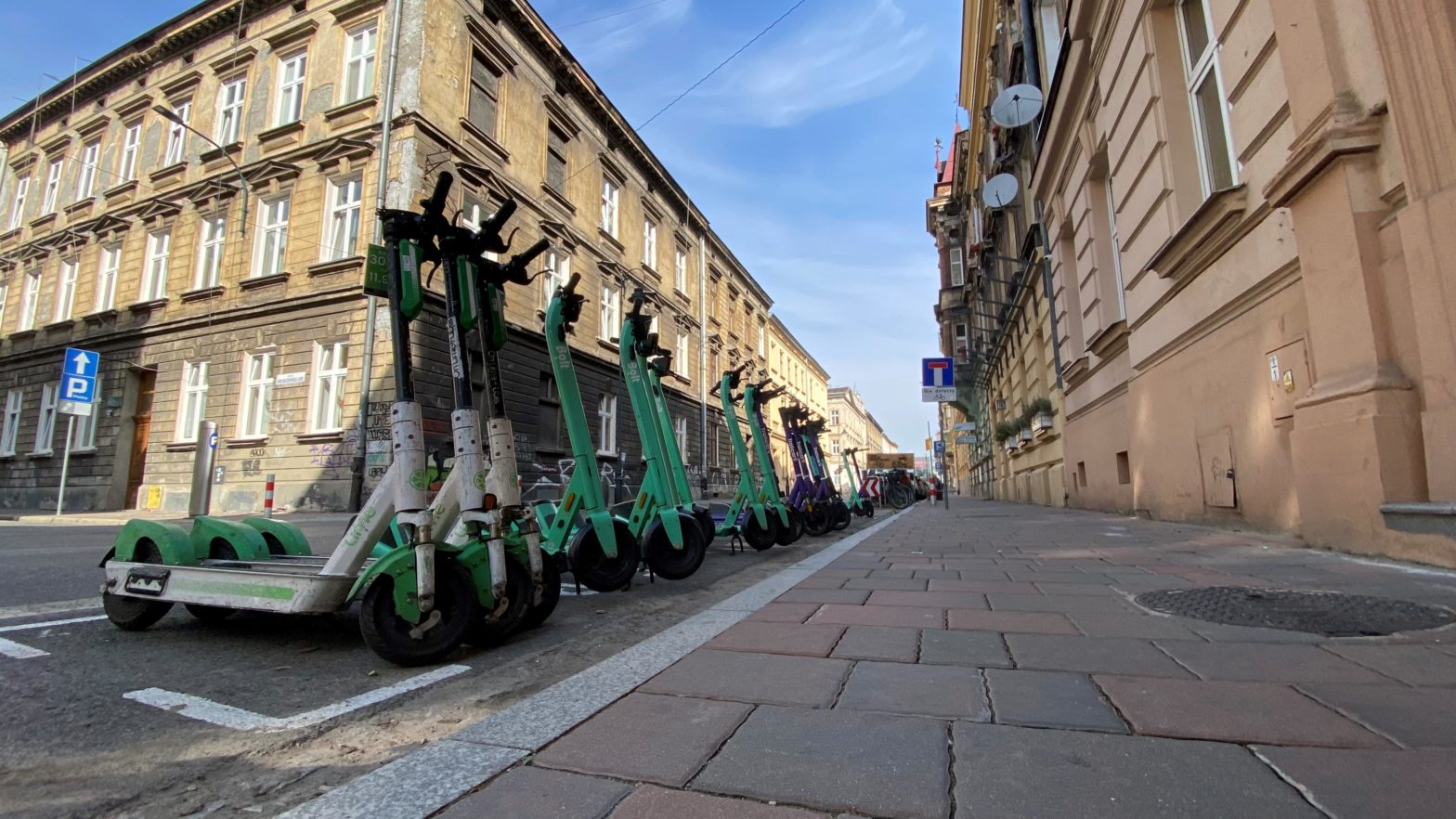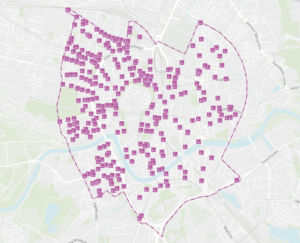
Photo: krakow city council
Krakow adopts rental solution for e-scooter parking
01 October 2024
by Christopher Carey
With Madrid recently joining Paris and Melbourne in banning rental e-scooters, cities globally are demonstrating a willingness to take decisive action to ensure order on their streets.
While the reasons surrounding the bans vary, one common theme is present – concerns over parking.
The issue is frequently cited by cities, residents and e-scooter companies as one of the main challenges facing the expansion of scooter schemes.
Some companies have invested heavily in geofencing technology to ensure people don’t leave scooters strewn on pavements or roads but cities have often complained that this technology is either not accurate or is not being used properly.
While docking stations offer one solution, these are expensive and it is tough to find public space in multiple locations, making if difficult to implement at scale. So over the last year, Krakow has been experimenting with a system which ties in all operators and levies charges through a third-party contractor where scooters are not left in designated zones.
“We took a completely different route to manage [ e-scooter parking], because there is no law in Poland right now where we are able to ban [e-scooter] services completely,” Lukasz Franek, Director, Krakow Transport Authority told Cities Today.
“We could try and fight [companies] locally, but from my point of view it wouldn’t be very fair and it would just finish in court.”
Chaos
In spring 2023, Krakow saw a big influx of e-scooters on its streets, with numbers almost tripling.
“There was chaos. The public and the media were asking how we could manage this, so we pushed the four operators [Lime, Bolt, Tier and Traficar] to come to an agreement that they finally all signed where parking would be regulated and only allowed in certain zones,” explained Franek.
Last year the city installed 150 zones – which vary in size but can park up to 20 e-scooters – before adding another 173 this year.

Each operator pays the city approximately US$1,585 per month to rent the zones, and to date the municipality has received US$64,600 in fees.
Since August 2023, the city mandated that any e-scooter found parked in an improper manner would see the operators incur a charge.
Krakow has entrusted its enforcement to a third party ‘relocation’ company contracted by the city.
“If anyone sees that an e-scooter is parked outside the zones or parked in an improper manner, they contact our dispatch centre, and we contact the company who then have two hours to relocate the e-scooter to the nearest spot,” added Franek.
“They then charge us for this, it’s about £2 (US$2.60) per e-scooter, and we in turn charge the operator. There’s no cost for us.”
The company documents each completed relocation in an online file that is accessible to the city and all operators, and to date a total of 20,263 relocations have been carried out.
Currently about half of the city area operates under these rules, with plans to expand in the future.

“For the operator it’s a little bit of a problem, because it’s less flexible for the users and they need to leave scooters in a certain spot,” added Franek.
“At the beginning the operators were scared, because the money they were being charged was huge – there was thousands of interventions [by the relocation company].
“But now after being in place for one year, I think it’s been very successful. E-scooter users are more aware and operators are more focused.
“From the point of view of the public, it’s stopped a lot of hate towards e-scooter companies, so I think it’s also beneficial for them. And from our point of view it’s good because we still have the [e-scooter] service, we don’t have to ban it.”
According to Marcin Wójcik, a specialist in the council’s sustainable mobility department, Krakow’s approach has been so successful that other Polish municipalities have contacted the city for guidance and contract templates.
“Our plans for the near future include gradually expanding the area of mandatory parking zones while simultaneously increasing their numbers.”
Industry view
While the city maintains the introduction of third-party inspectors has made parking orderly and efficient, it has also proved to be an expensive issue for the four firms.
There have also been disagreements about the charges levied, with some firms saying inspectors have been overzealous in their policing of improperly parked e-scooters.
Tier have maintained that while the city “closely involved” all the operators when forming the current regulations, the cost burden has been an issue.
“We are thankful for the continuous and constructive discussions on this topic,” a spokesperson from the firm told Cities Today.
“That being said, after a year of introduction, we can say that the measures are a cost burden for the operators.
“[This is] very unfortunate as it could have been avoided if some of our competitors had been able to self-regulate their fleet size.
“The cost of this parking regulation is unfortunately preventing us from investing more in the city.
“One possible change [to the rules] could be to adjust parking fees based on sustainable and social commitments from operators. For instance, in Budapest, parking rent fees can be reduced up to 50 percent for operators if they use zero-emission vehicles for their [pick-up and drop-off] operations.”
Striking a balance
For Franek however, the measures are needed to strike a fair balance between regulating parking while keeping residents happy.
They were also necessary due to the differences in how each firm operates.
“Initially the companies suggested that when we got a notification to our dispatch centre [of an improperly parked e-scooter] we should contact them first and if they confirm within 5-10 minutes that they will do it themselves, then we leave it to them [to rectify] using the same rules like taking a photo and relocating [the e-scooter] within two hours.
“But in the end we decided against this because of the differences between the operators.
“Although they say they are cooperating they are not – they’re competing with each other.
“In the end I think our approach works as it means we don’t have to look towards banning e-scooters, and we can keep users [of e-scooters] relatively satisfied while keeping the wider public much happier.”
Image: Krakow City Council













